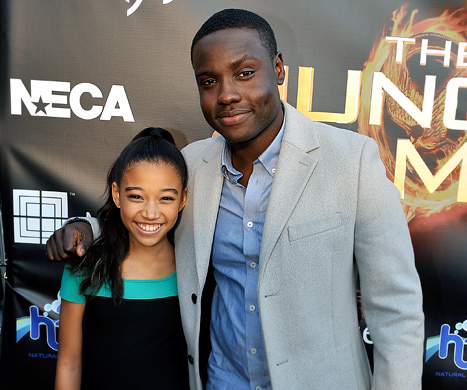[pullquote1 quotes=”true” align=”center”]Cogito Ergo Scribo[/pullquote1]
Editor-in-Chief
In all the hype surrounding last week’s Hunger Games, apparently there was more to be upset about than simply the
price of the movie ticket. Our generation took to the internet to air their vast displeasures about one aspect of the film: the races of some of the characters.
Apparently, Cinna, Rue, and Thresh’s dark skin created a ripple amongst the most devout of fans, despite Collins’ own descriptions of these char- acters in the book (both Rue and Thresh were said to have “dark skin”). Tweets came in as soon as the full cast was announced and, last time I checked, they are still rolling in, using various racial slurs to note unhappiness with casting choices, and even going so far as to exclaim being less upset about Rue’s death because of her race.
When I saw these I literally gasped. Sure, I wasn’t insanely pleased with the film, but the races/skintones of the actors were not even on my radar of critique. The amount of offensive uproar about a detail, one that was even mentioned in the story, frankly astounded me. Interestingly, other people were upset that Katniss, described as having “olive skin” in the books, would be played by a blonde-haired blue-eyed actress.
To me, a mix of races on a film screen merely seems like a mirror to the real world. But now think back to the last five movies you’ve seen: how many main characters were played by white actors or actresses? The last two movies I saw cast not one actor or actress who was not more than slightly tan, but I didn’t notice that either until I thought about it just now. There are many ways to crumble the cookie, but overall, I don’t use race as a tool for judgement. One would think, being in the enlightened world we are, that at least the part of our generation enrolled in places of higher education would have eschewed race as a legitimate issue. The fact that intelligent people continue to judge others, even those from similar walks of life, based on skin color is actually crazy.
This is even on the crazy end of the spectrum (think: the most partisan Tea Party Republicans). However, any casual wander to the scrolling lists of tweets will garner a less-shocking but still pernicious glimpse into the modern youth’s view of equality. Myriad trending topics like #whitepeopleproblems, #firstworldproblems, and other meme tie-ins along those lines are prompting peals of lol-ing across the nation. SNL also recently created skits based around “white people problems,” and stuffwhitepeoplelike.com has long been leading our generation’s jovial treatment of racial distinctions.
Honestly, I often find these one-liner comments to be pretty hilarious, and ring with a grain of truth. However, #whitepeopleproblems and #firstworldproblems tend to be synonymously used, which does not do much to cast our internet-savvy jokesters in a kind light. What does “white people” mean to us in the context of today’s cultural landscape? Does it mean Caucasian, or is it synonymous for a socioeconomic status, or perhaps a marker just for the general well-educated world participant?
I’m not certain whether our generation’s tendency towards racial-distinction humor is, like I once thought, a marker that we don’t see race as an issue any more, or oppositely, that we have developed just another way to highlight the distinctions between groups of people. In my eyes, the distinction is pernicious whether it is used for entertainment or to bully. I might not recognize race because I am a Caucasian female currently subsisting in a white-majority environment, surrounded by people who don’t view our silly meme-based bantering as any sort of threat, or really any more than a few key-clicks from an “lol,” regardless of skin color. This I am glad for; I am glad that I have somehow grown up in an environment supportive of human equality and mutual respect. Anyone who is upset a popular book character is played by an actress with darker skin than them hasn’t been as lucky, and I feel for them.
Mostly, I hope this milieu will eventually shift towards a more respectful default; this has obviously occurred in great leaps and bounds in the not-too-distant past, but we have to finish the initiatives that the great people who have come before us so passionately put into place. Don’t settle into the “casual racism” of the twitter-sphere. Yes, a little “racial humor” is okay now-and-then, but highlighting our differences all the time does nothing to bring us closer together.
Questions? Email Lauren at lauren.bejzak@fandm.edu.
